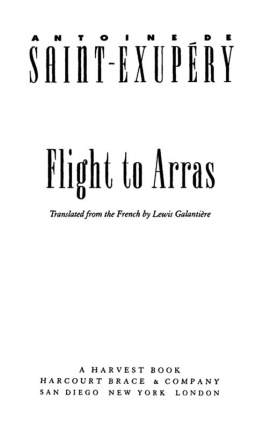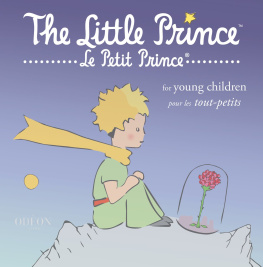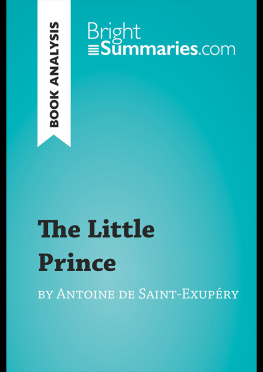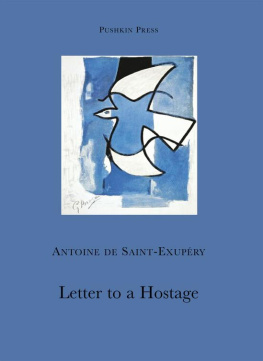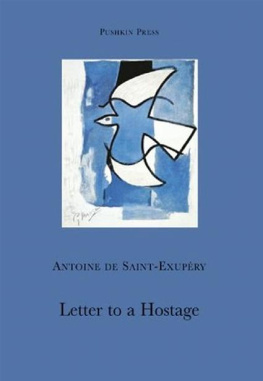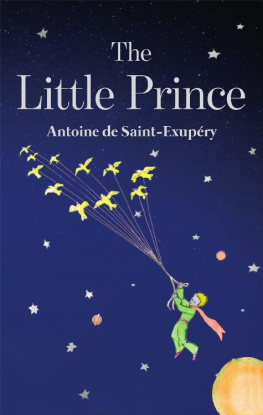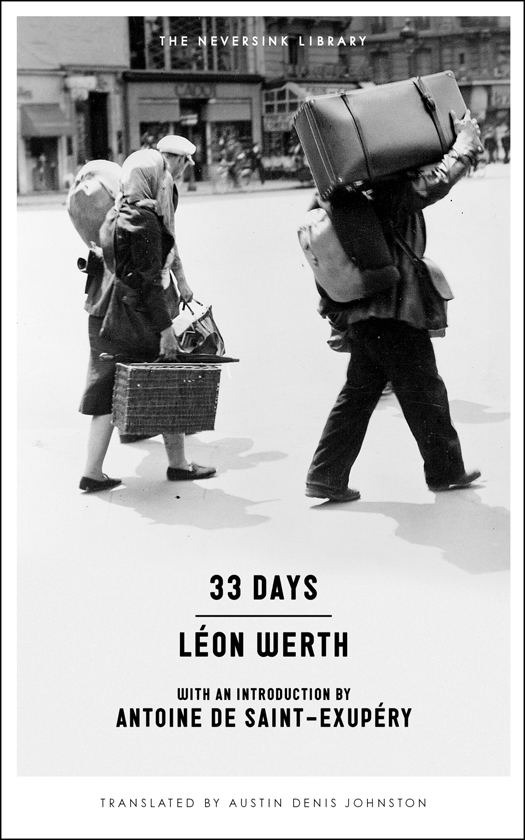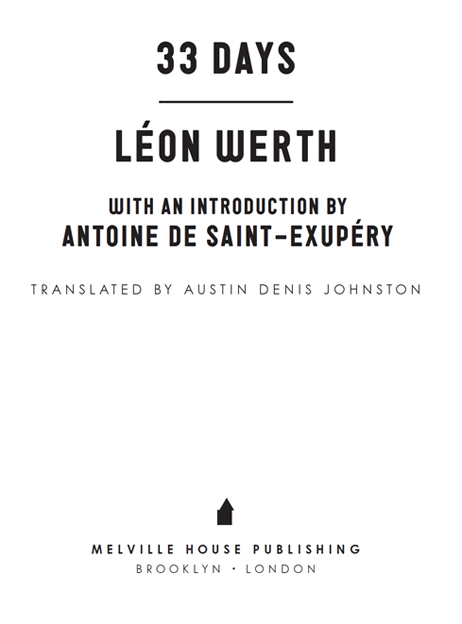33 DAYS
LON WERTH (18781955) was born in Remiremont, France, to a Jewish clothier. Though he was a brilliant student, he dropped out of school to devote himself to writing art criticism, publishing his first critique in the Paris-Journal in 1911. His first novel, The White House, was a finalist for the Prix Goncourt in 1913. Werth was an anti-bourgeois anarchist, a bohemian, and a leftist Bolshevik supporter. In spite of his politics, however, he was assigned to be a radio operator during World War I, until he was diagnosed with a lung infection and released from service. In 1922, he married Suzanne Canard, and she would later also become active in the Resistance. Werth wrote critically of the Nazi movement and colonialism, became a Gaullist, and contributed to Claude Mauriacs journal Libert de lEsprit. In 1931, he was introduced to Antoine de Saint-Exupry by a mutual friend, and they become extremely close. Saint-Exupry referred to Werth in three of his books and dedicated two to him. In addition to 33 Days, Werth also wrote Dposition, his journals from 1940 to 1944, while hiding from the Nazis in the Jura Mountains region. He died in Paris on December 13, 1955, at the age of seventy-seven.
ANTOINE DE SAINT-EXUPRY (19001944) was a poet, philosopher, aviator, and the author of The Little Prince, which has been translated into over 250 languages. His interest in flying inspired him to write Wind, Sand and Stars and Night Flight. He disappeared over the Mediterranean during a military reconnaissance mission in July 1944.
AUSTIN DENIS JOHNSTON, a former editor, spent seventeen years at Time, Inc., where he also supervised French and Spanish translations.

THE NEVERSINK LIBRARY
I was by no means the only reader of books on board the Neversink. Several other sailors were diligent readers, though their studies did not lie in the way of belles-lettres. Their favourite authors were such as you may find at the book-stalls around Fulton Market; they were slightly physiological in their nature. My book experiences on board of the frigate proved an example of a fact which every book-lover must have experienced before me, namely, that though public libraries have an imposing air, and doubtless contain invaluable volumes, yet, somehow, the books that prove most agreeable, grateful, and companionable, are those we pick up by chance here and there; those which seem put into our hands by Providence; those which pretend to little, but abound in much.
HERMAN MELVILLE, WHITE JACKET
33 DAYS
Originally published by Viviane Hamy, 1992
Copyright 1992 by Lon Werth
Translation copyright 2015 by Austin Denis Johnston
Lettre lami copyright by Antoine de Saint-Exupry
First Melville House printing: April 2015
Grateful acknowledgment is made to the Estate of Antoine de Saint-Exupry for permission to print Letter to a Friend.
Melville House Publishing
145 Plymouth Street
Brooklyn, NY 11201
and
8 Blackstock Mews
Islington
London N4 2BT
mhpbooks.com facebook.com/mhpbooks @melvillehouse
Library of Congress Cataloging-in-Publication Data
Werth, Lon, 18781955.
[33 jours. English]
33 days : a memoir / Lon Werth; translated by Austin Denis
Johnston; with [Letter to a Friend] by Antoine de Saint-Exupry.
pages cm. (Neversink)
ISBN 978-1-61219-425-7 (paperback)
ISBN 978-1-61219-426-4 (ebook)
1. Werth, Lon, 18781955. 2. Authors, French20th centuryBiography. 3. World War, 19391945Personal narratives, French. 4. World War, 19391945France. I. Saint-Exupry, Antoine de, 19001944. II. Title.
PQ2645.E7A1813 2015
848.91209dc23
[B]
2015002131
Design by Christopher King
Cover photograph: Exodus, Place de Rome, Paris, June 1213, 1940.
Courtesy of Roger-Viollet / The Image Works
Cet ouvrage publi dans le cadre du programme daide la publication bnficie du soutien du Ministre des Affaires trangres et du Service Culturel de lAmbassade de France reprsent aux tats-Unis.
This work, published as part of a program of aid for publication, received support from the French Ministry of Foreign Affairs and the Cultural Service of the French Embassy in the United States.
v3.1
CONTENTS
EDITORS NOTE
This book is based on a manuscript that was smuggled out of Nazi-occupied France in October 1940 by Antoine de Saint-Exupry, who took it to New York with the intent of getting the book published in English. But the manuscriptwhich consisted of his friend Lon Werths firsthand account of his escape just months before from Paris, and an introduction to that account written by Saint-Exupry himselfwas never published, and subsequently vanished. Fifty years later, in 1992, Werths French-language text was rediscovered and published by the French publisher Viviane Hamy. However, that edition did not include Saint-Exuprys introduction, which remained lost. In 2014, the introduction was rediscovered in a Canadian library by Melville House, and thus this book represents not only the first English-language edition of 33 Days, but the first edition to include both the complete, original text and the introduction, as originally intended by Werth and Saint-Exupry.
Werth had asked Saint-Exupry to smuggle the book out of France because, as a Jew, Werth was not allowed by the French government to publish anything. Forced to hide out in Frances Jura Mountains and unable to move about as easily as his non-Jewish friend, Werth also no doubt felt, as did Saint-Exupry, that an English-language version of his gripping, firsthand testimony might be useful to Saint-Exupry in his greater mission in going to New York, which was to stir American support for intervention. After all, the story of the massive French flight from the approaching Nazi Werhmacht in May and June of 1940a migration of such biblical proportions as to now be called by historians lExode, or The Exoduswas largely unknown in the United States. Werths account remains, in fact, one of the few eyewitness documentations of the Exodus, which is estimated to have involved more than eight million people, and to have been the largest mass migration in human history.
In New York, Saint-Exupry did manage to find an agreeable publisher: Brentanos, a bookstore that during the war years also published French-language books in translation. Saint-Exupry asked for nothing more than a military parcel consisting of chocolate, cigarettes, and water purification tablets for payment, and was so certain of the publication that he mentioned 33 Days in a book of his own published around that time, Pilote de guerre. However, for reasons that remain unknown, the book never appeared, and the manuscript was lost. Saint-Exupry was apparently so frustrated by the failed publication that he took his introduction, at least, and expanded it into another wartime book, Letter to a Hostage, with the hostage being Werthwho goes unnamed for his protection.
While Werth would survive the war and go on to write numerous books, Saint-Exupry would not: his plane disappeared while on a reconnaissance mission over the Mediterranean in July 1944, presumably shot down by the Germans.


